 |
| Elisabeth Moss Photo by Van Sarki |
‘I don't take acting that seriously. I'm a Valley girl’: Elisabeth Moss on life after Mad Men
From Mad Men to High-Rise, the actor has made her mark playing earnest, tightly wound women. So how come she’s known as the class clown?
Tom Shone
Saturday 12 March 2016 09.00 GMT
Elisabeth Moss gets people coming up to her all the time and asking how she’s doing. Is she sad Mad Men ended? Was it hard? The last day of shooting was, she tells them. The producers saved all the scenes in the ending montage until the very end, so all the actors would be there that day. “It was like, ‘All right, so and so is up’ and everyone would trudge to set and two more actors would wrap. You would be crying. Walk away. Weep some more. ‘All right, it’s Vinny [Kartheiser]now. Let’s go,’ and everybody would go. It happened six, seven times that day. I left and I went home. I felt proud. We had wrapped. We were done. Then, almost a year later, it starts airing and all of a sudden everyone is asking you about it again, and everyone is going through their own cathartic experience of it ending. You are going, ‘Right. OK. I’ve got to get back there.’ I had done four movies since then, and I was doing a Broadway play at the time. They were going through their own grieving process. You are like, ‘I know. It is awful. It is sad. Right. It is reallysad…’”
Moss laughs at her predicament – commiserating on behalf of people commiserating with her, even though she herself is not particularly sad – which seems born of her particular mixture of celebrity, breeziness and politeness. She has a hard enough time keeping the episodes of Mad Men straight in her head. “You could have asked me what we shot last week or what happened in the last episode. I don’t remember. I can’t tell you how many times I have been online to check the little plot summaries to remind myself. I swear to God.”
In person, Moss is ebullient, flip, much more so than she is on screen, where she excels at quiet, tightly wound characters who suppress their feelings to get on with the job: earnest, driven Peggy, the timid secretary turned ace copywriter in Mad Men. Or her New Zealand detective in Jane Campion’s superb Top Of The Lake, returning to her home town to investigate the disappearance of a 12-year-old girl, antennae twitching, steeling herself against her own traumas. On set, though, she is known as a joker, always the ringleader in games of Heads Up! – a charades app – on the set of Mad Men, whose cast voted her class clown. She once rolled up to the set to ask them, “Do you remember when I used to come in and bring you assholes drinks and leave, and that was my job?” Method she is not.
As Peggy in Mad Men. Photograph: Rex
“Feel free to write that I am interesting and brooding, and very mysterious – I would be happy with that,” she says after turning up at a restaurant in Brooklyn wearing what she calls a “horrible outfit”: black sweatpants adorned with what appear to be silver leopard paw prints, Ugg boots and a cream-coloured turtleneck, all topped off with a tangle of sunny blond hair. “My work outfit,” she says, “I prefer to be messy. I like to have my hair messed up. I like to be covered in dirt. That is when I am having fun. I am like a pig in shit.
“I wish I was super-serious, anguished,” she adds. “I see those actors and I am like, oh God, they are so cool and they seem so interesting. I don’t take acting that seriously. I love my work, but I do not think that I am saving the world, and I do not think that I am doing anything brave by accessing emotions that I might have for roles. I am a Valley girl.”
As we speak, New York is bracing itself for a snowstorm. The bar begins to fill with refugees from nearby offices. Moss orders a beer and a salad, although she barely touches the beer. She’s not much of a drinker. When director James Vanderbilt called Mad Men creator Matt Weiner to find out what it was like working with Moss, before casting her opposite Robert Redford in Truth, about the professional unravelling of American newscaster Dan Rather, Weiner told him two things: “Elisabeth never gives a bad take and she is a rubbish drinker.” When not working, she will hole up in her apartment on the Upper West Side for days, weeks, at a time, binge-watching Scandal, Parenthood, Nashville or The Good Wife. “Like, not leave the house,” she says. “I get sad anytime anybody makes me leave. I get pissy. I really do.”
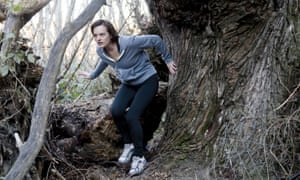
In Top Of The Lake. Photograph: Rex
“You can always find Elisabeth around Japanese food,” says Jane Campion, who wrote and directed Top Of The Lake, for which Moss won a Golden Globe. After the 2013 Emmys, for which the show got eight nominations, Moss took Campion and her production team to her favourite sushi restaurant on Sunset Boulevard, ordering for everyone. “She was looking after us,” Campion tells me. “Whenever she likes something, be it food or clothes or shoes, she orders heaps of it. I remember her apartment in New Zealand was piled with boxes. She does girly-girl very well.”
At the same time, Campion says, Moss “isn’t afraid to say no. I think that’s really important for a woman in this industry: not to be afraid of upsetting somebody.” Recently, Moss pitched to a series of production companies a project she had been working on for a couple of years, based on a book she had optioned (she won’t say which), with herself attached to star. “We were told by more than one place that it was too female, which was shocking,” Moss says. “The feedback is, like, oh, we are not sure, because it is two females… I actually asked if it was legal for them to say that.”
These two sides to Moss – the lover of shoes and the stubborn truth-teller – are the twin threads that made Peggy Olsen, in the words of New York magazine, “the most GIF-ed feminist icon of all time”. Now, the first seeds of Moss’s post-Mad Men career are beginning to bear fruit. This month sees the release of both Vanderbilt’s Truth and Ben Wheatley’s adaptation of JG Ballard’s 1975 fable High-Rise, about the disintegration of a tower block into anarchy. The book is Ballard in full suburban-apocalypse mode, and the film, almost a period piece, is a wild, chaotic mash-up of Kubrick and Mike Leigh, with lots of tight-lipped social climbers and petty bureaucrats finding their inner caveman amid the shag-pile rugs. Moss plays the wife of a thuggish TV documentarian who leads the tower block in revolution: cocktail glass held aloft, smoking through her pregnancy, eyes averted from her husband’s philandering.
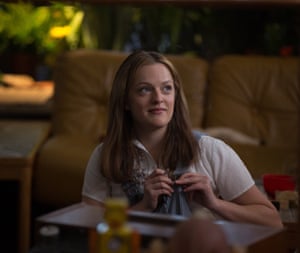
In new film High-Rise. Photograph: Aidan Monaghan/Studio Canal
“There was something about Helen’s innocence and her lost quality, her odd whistling-in-the-dark thing,” Moss says, describing what drew her to the role. “Whereas other characters go crazy, and the building brings out the worst in them, I feel like it actually brings out the best in her. She becomes a happier person. She finds love. She gets out of her apartment for what you feel is the first time in probably a while.”
For a moment, I wonder if we have seen the same film. Her part looked to me like Ballard’s vision of a suburban housewife gone to hell. But Moss is relentlessly upbeat in her assessment of other people’s characters and motives. It’s a quality you get from her performances, too; that slight blinkeredness that allows her to walk into the lion’s den and tame some otherwise aggressive, borderline abusive alpha males: Don Draper in Mad Men, Peter Mullan’s hot-tempered, domineering patriarch in Top Of The Lake. She’s the Brute Whisperer. She laughs when I point this out.
“I love that,” she says. “That is awesome. Totally. You are like, ‘There are nice men out there. Doesn’t she know?’ What is weird is, I haven’t really had a lot of [brutes] in my life. I find I like the decent ones. But, for dramatic purposes, it is far more interesting to play the dark side of anything. I do think that there is something about an intelligent, strong woman, who also needs to be taken care of, that will attract a certain kind of man sometimes. And that relationship is interesting on screen. Bad relationships are more interesting than good relationships to watch.”
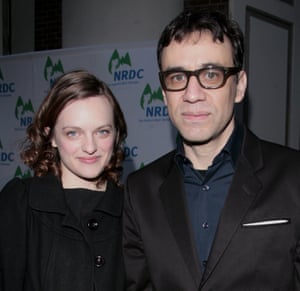

With ex-husband Fred Armisen. Photograph: Rex
In real life, Moss married Saturday Night Live comedian Fred Armisen in 2009, after being introduced to him when Don Draper actor Jon Hamm hosted the show. They separated just eight months later, and Armisen said on the Howard Stern show in 2013 that he had been a “terrible husband”. He later went even further, suggesting to podcaster Marc Maron that he thought he had married Peggy: “I was getting to know the other people from the show and her, and it was very, very exciting, and I only got caught up in that part of it. I have a problem with intimacy, where all of a sudden, there’s a real person there… and now, there’s a person behind this. It’s not the girl on Mad Men.”
When I ask Moss about the marriage, she sounds very much as if she is still looking for her part in it. “God, I learned so much that I am still sifting through it. I was young. I was 27, and certainly I am still young, but now, looking back, six years ago, it seems young. I didn’t know everything about what I wanted, and what I was looking for. I didn’t know everything about what you were supposed to have. With time, I think, you learn who you are, and what you need.”
Moss was raised, and remains, a Scientologist. She has long since given up defending the religion, speaking with the honest conviction of someone who knows their own belief to be pure-hearted. “It is weird for me to be put in the position where I am like, ‘No, I can’t. I don’t really want to talk about this.’ You feel kind of like, I am a nice person who likes to talk about stuff. I also get the curiosity. I get the fascination. I become fascinated with things that are none of my business as well. I am just fascinated when someone breaks up with somebody. I want to know all about it. I am very interested in what people are wearing, and all of that kind of thing, but you have a right to your privacy.”
Dress: Marc Jacobs. Jacket and knit (top): Fendi. Photograph: Van Sarki for the Guardian. Styling: Priscilla Kwateng. Hair: Tommy Buckett. Makeup: Daniel Martin at the Wall Group
There is a strain of optimism to Moss that one could easily see leaving her open to exploitation by others, even as it lends vulnerability to her performances. “I like characters who have two different things going on, whether it is Robin from Top Of The Lake having that strength juxtaposed with the vulnerability and being in pain, or whether it is Peggy from Mad Men with her naivety and her sort of idiocy at times, combined with her intelligence and courage really to do what she did at that time. I felt with Helen [her character in High-Rise], it was the innocent, naive quality combined with this sort of bravery and optimism.”
This juxtaposition – the feeling of being slightly out of kilter with her environment, or time, that made Peggy so compelling – goes back, in part, to Moss’s childhood, growing up in what used to be a hippy enclave in Los Angeles. Her mother was a harmonica player in a blues band, her father a music manager who was “always on tour with clients. My earliest memories are at the Blue Note here in New York, or backstage at different theatres or different clubs, dressing rooms. We grew up with musicians coming over, jamming. We had tons of instruments. So holidays were always like, 50 people would come over and there would be a jam session with everyone playing jazz. Not rock. When I was 12, I didn’t know about Nirvana or Oasis or any of those people. I was listening to Ella Fitzgerald and Gershwin. I was raised with a lot of classical music. I loved ballet. I was a bun head for 10 years.”
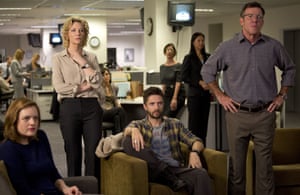
With Cate Blanchett in Truth. Photograph: Rex
Her parents later separated – her father now lives in Florida – but she remains very close to her mother, who lives nearby in New York, and her brother, who is 18 months younger. Music, too, remains very important. Moss often has her headphones on between takes, partly because it stops people talking to her. She listened to a lot of Max Richter and Icelandic band Sigur Rós during Mad Men (“That is my go-to, if I need to go to a darker place”). For the most wrenching scene in Top Of The Lake, where she recalls being raped, she charged herself up on Eminem. “Really loud. For some reason I was like, this is what I need, and it got me to this place that I needed to be in.”
“I would often see her with her headset on,” Campion recalls, who was persuaded to cast Moss after seeing the audition tape of that scene. “It was remarkable for being so quiet. She was very simple. As you’re watching it, you’re thinking, oh, it doesn’t look like she’s trying. I just found myself really interested in watching all the way through this gentle but quiet, obviously interior performance. It was coming from the inside out. Sometimes you get to the end of a project and you think, ‘I don’t really think they have much more to show me.’ With her, at the end of about six hours, I was still really interested. She’s a little bit like a Mona Lisa. There’s a lot that she’s not showing you.”
They first started talking about a second series at Moss’s favourite sushi restaurant after the Emmys, and continued the conversation while she was shooting Truth in Sydney. “We met a few times for dinner there, and really we just gossiped – what we’re doing, family, you know?” Campion says. But Moss’s one condition for doing the series was simple: take her character to an even darker place. “I think it’s to do with a little lamp that is switched on inside Elisabeth,” Campion says. “I think it always shines brightest in the dark.” She laughs. “When I had an opportunity, I really put her through it.”
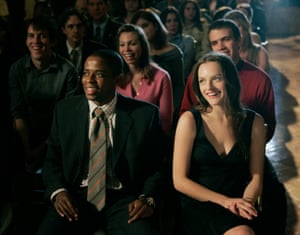
As the president’s daughter in The West Wing. Photograph: Mitch Haddad/Warner Bros/Getty Images
Top Of The Lake starts shooting in Sydney this month. The weekend after we meet, Moss is due to begin work with her dialect coach, to help dust off her kiwi accent: she tends to wipe clean after she is done with a part. It may be what allows her such blitheness as she dances with the devil on screen – that and Sigur Rós. One track, in particular, has seen her through everything – Mad Men, Top Of The Lake, High-Rise. “It might be my favourite Sigur Rós song,” she says, grabbing her phone to look for it. “I think it is this one. Hold on. No, it’s not that one. Oh. OK, I know what it is, but it is not on an album. It is really long, like nine minutes long.”
She flicks her iPhone and finds the track: Festival on Með suð í eyrum við spilum endalaust. “It is the one with the greatest build of all time,” she says. “I have never heard anything like it. That one was good for Top Of The Lake. So good. The singer would probably be the number one person I want to meet in my life. He has been with me through so much. I just think he is amazing. The whole group is amazing. I have seen them, like, five times… Oh, I would die.”
It’s time to wrap up. The snow is beginning to whip at the windows, and it is dark outside. But Moss could not be happier. Inside, looking out at the storm, is her favourite place to be.

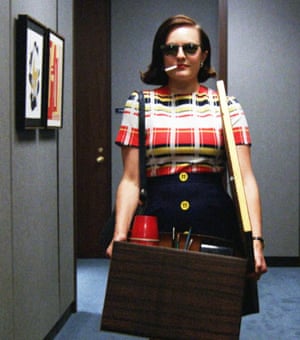
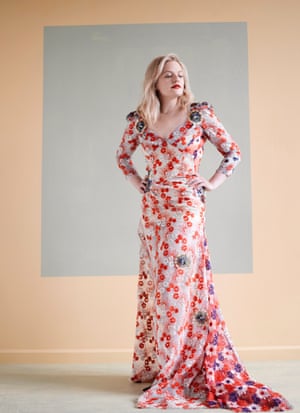

No comments:
Post a Comment